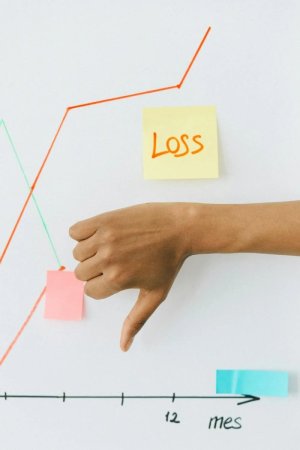Is a recession looming? Find out how tariffs might trigger it and when it becomes official
By
Veronica E.
- Replies 2
The thought of a recession can be unsettling, especially when it's hard to predict what will happen next.
Recently, changes in trade policies, particularly the introduction of new tariffs, have sparked concerns about an impending economic downturn.
If you're feeling uncertain about what these tariffs mean for your finances and whether the US might be on the brink of a recession, you're not alone.
Let’s dive into the impact tariffs have on the economy and how a recession is officially declared, so you can better understand what’s happening and what it means for you.
The GrayVine is here to clear up the confusion and offer insight into the complex world of tariffs and recessions.
By understanding the key factors at play, you can be better prepared for what’s to come and stay ahead of the curve.

The tariff turmoil and recession fears
When new tariffs are introduced, they don't just impact the products we see on store shelves; they can send shockwaves through the global economy.
The tariffs enacted by the Trump administration have raised trade tensions, with economists warning that they might contribute to a potential recession in the US and beyond.
In fact, following the announcement of these tariffs, there was a significant rise in Google searches for the term "recession," and financial experts adjusted their predictions for the US economy.
Goldman Sachs increased the possibility of a US recession, while JPMorgan raised the global recession risk to 60%.
Still, some government officials remain optimistic about the economy’s resilience, emphasizing the strength of job growth and focusing on long-term stability.
What exactly is a recession?
A recession refers to a sustained period of economic decline, and while most people associate it with two consecutive quarters of GDP decline, it’s actually more nuanced.
The National Bureau of Economic Research (NBER) uses a broader definition, stating that a recession is marked by a "significant decline in economic activity that is spread across the economy and lasts more than a few months."
In simpler terms, it’s a time when businesses slow down, jobs are lost, and consumer confidence wanes.
Also read: Trade tensions rise between US and Canada—tariff decisions pending
Who officially declares a recession?
It's not the government that officially declares a recession—it's the NBER’s Business Cycle Dating Committee, a group of top economists who determine when the economy has entered a recession.
They assess data over time to ensure their conclusions are accurate.
This process can take anywhere from four to 21 months, so the declaration of a recession is not immediate.
For instance, the NBER announced in June 2020 that the US had entered a recession in February, which was later declared over in April of the same year.
Also read: One major industry just dodged Trump’s global tariff—Here’s why it matters to you.
What happens during a recession?
During a recession, the economy contracts, and this can have ripple effects on many aspects of life.
Job losses, falling stock markets, and higher borrowing costs are some of the consequences, making it harder for individuals and businesses to thrive.
Consumer confidence tends to decline, leading to decreased spending, which can further deepen the downturn.
As the economy struggles, many might feel the direct impact in their day-to-day lives.
Also read: Discover 7 groceries immune to tariffs: How to outsmart rising prices at the store
How common are recessions?
Recessions happen periodically, often triggered by different factors such as inflation, pandemics, or even wars.
Since 1857, the US has experienced 34 recessions, with each lasting different lengths of time.
On average, recessions last just over 11 months, and they tend to happen about once every six years.
While less frequent, depressions are much more severe, such as the Great Depression of the 1930s.
While current economic indicators and tariff impacts have created uncertainty, it’s important to remember that recessions are a natural part of the economic cycle.
For the GrayVine community, staying informed and prepared is essential.
By monitoring your personal finances, diversifying your investments, and being mindful of spending, you can better navigate uncertain economic times.
Read next: Trillions lost in a day–Wall Street plunges amid growing global tensions

We’d love to hear your thoughts! How are you feeling about the current economic situation? Have you made any adjustments to your financial plans in response? Join the conversation in the comments below, and let’s support each other as we navigate through these uncertain times.
Recently, changes in trade policies, particularly the introduction of new tariffs, have sparked concerns about an impending economic downturn.
If you're feeling uncertain about what these tariffs mean for your finances and whether the US might be on the brink of a recession, you're not alone.
Let’s dive into the impact tariffs have on the economy and how a recession is officially declared, so you can better understand what’s happening and what it means for you.
The GrayVine is here to clear up the confusion and offer insight into the complex world of tariffs and recessions.
By understanding the key factors at play, you can be better prepared for what’s to come and stay ahead of the curve.

Exploring the potential impact of tariffs on a possible recession. Image Source: Pexels / Nataliya Vaitkevich.
The tariff turmoil and recession fears
When new tariffs are introduced, they don't just impact the products we see on store shelves; they can send shockwaves through the global economy.
The tariffs enacted by the Trump administration have raised trade tensions, with economists warning that they might contribute to a potential recession in the US and beyond.
In fact, following the announcement of these tariffs, there was a significant rise in Google searches for the term "recession," and financial experts adjusted their predictions for the US economy.
Goldman Sachs increased the possibility of a US recession, while JPMorgan raised the global recession risk to 60%.
Still, some government officials remain optimistic about the economy’s resilience, emphasizing the strength of job growth and focusing on long-term stability.
What exactly is a recession?
A recession refers to a sustained period of economic decline, and while most people associate it with two consecutive quarters of GDP decline, it’s actually more nuanced.
The National Bureau of Economic Research (NBER) uses a broader definition, stating that a recession is marked by a "significant decline in economic activity that is spread across the economy and lasts more than a few months."
In simpler terms, it’s a time when businesses slow down, jobs are lost, and consumer confidence wanes.
Also read: Trade tensions rise between US and Canada—tariff decisions pending
Who officially declares a recession?
It's not the government that officially declares a recession—it's the NBER’s Business Cycle Dating Committee, a group of top economists who determine when the economy has entered a recession.
They assess data over time to ensure their conclusions are accurate.
This process can take anywhere from four to 21 months, so the declaration of a recession is not immediate.
For instance, the NBER announced in June 2020 that the US had entered a recession in February, which was later declared over in April of the same year.
Also read: One major industry just dodged Trump’s global tariff—Here’s why it matters to you.
What happens during a recession?
During a recession, the economy contracts, and this can have ripple effects on many aspects of life.
Job losses, falling stock markets, and higher borrowing costs are some of the consequences, making it harder for individuals and businesses to thrive.
Consumer confidence tends to decline, leading to decreased spending, which can further deepen the downturn.
As the economy struggles, many might feel the direct impact in their day-to-day lives.
Also read: Discover 7 groceries immune to tariffs: How to outsmart rising prices at the store
How common are recessions?
Recessions happen periodically, often triggered by different factors such as inflation, pandemics, or even wars.
Since 1857, the US has experienced 34 recessions, with each lasting different lengths of time.
On average, recessions last just over 11 months, and they tend to happen about once every six years.
While less frequent, depressions are much more severe, such as the Great Depression of the 1930s.
While current economic indicators and tariff impacts have created uncertainty, it’s important to remember that recessions are a natural part of the economic cycle.
For the GrayVine community, staying informed and prepared is essential.
By monitoring your personal finances, diversifying your investments, and being mindful of spending, you can better navigate uncertain economic times.
Read next: Trillions lost in a day–Wall Street plunges amid growing global tensions
Key Takeaways
- The Trump administration's tariffs on imports have raised fears of a recession among consumers and disrupted global markets.
- Prominent banks like Goldman Sachs and JPMorgan have increased their predictions of the likelihood of a recession due to the new tariffs.
- The National Bureau of Economic Research (NBER) is the body that officially declares recessions, using a broader definition than the commonly cited "two consecutive quarters of decline in GDP."
- Recessions entail a period of economic decline with various consequences, such as reduced employment and spending, and have occurred 34 times in the US since 1857, with varying durations and severity.
We’d love to hear your thoughts! How are you feeling about the current economic situation? Have you made any adjustments to your financial plans in response? Join the conversation in the comments below, and let’s support each other as we navigate through these uncertain times.






